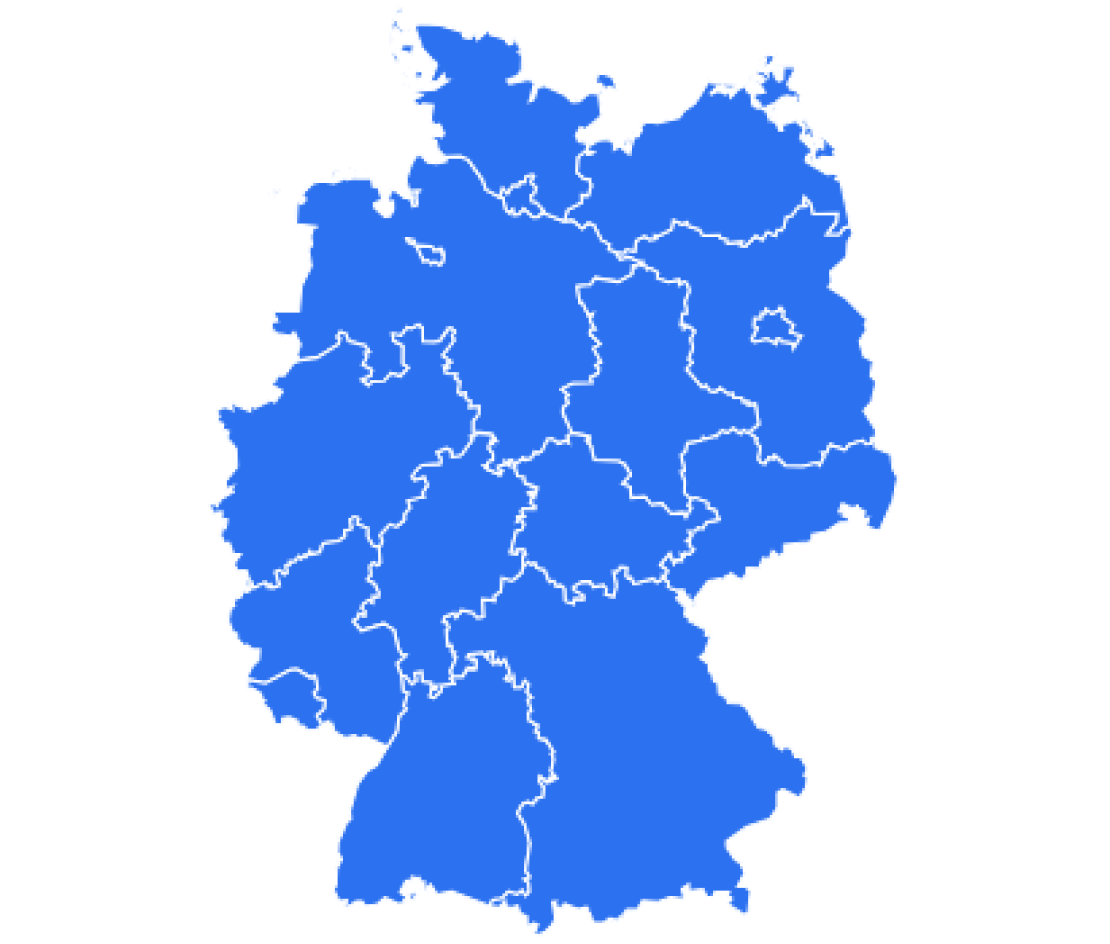Grow your team in
Germany effortlessly
Germany effortlessly
Enjoy swift onboarding in Germany – 6 days on average.
Explore for Free
Simple Hire in Germany
Setting up your business in Germany usually requires establishing a local entity,which can be complex. Brix handles compliance with labor laws and taxes, from collecting tax documents to managing payroll. Trust Brix for global employment solutions, even without a local entity.
Explore for Free

Facts & Stats
Country Map
Talent Distribution

CURRENCY
EUR
OFFICIAL LANGUAGE
German
CAPITAL
Berlin
PAYROLL FREQUENCY
Monthly
Developer Avg Salary
€45,000 - €75,000/yr
Essential benefits tailored for Germany
You can easily offer all the necessary benefits, tailored to meet the specific needs of your team,
ensuring a competitive and rewarding employee experience with Brix.
ensuring a competitive and rewarding employee experience with Brix.
 Health Insurance
Health Insurance Unemployment Insurance
Unemployment Insurance Private Healthcare - Unisure (optional)
Private Healthcare - Unisure (optional) Nursing care insurance (Long term insurance fee)
Nursing care insurance (Long term insurance fee) Private Healthcare - AXA (optional)
Private Healthcare - AXA (optional) Pension Fund
Pension Fund Workers Compensation Insurance
Workers Compensation Insurance Private Healthcare - Allianz (optional)
Private Healthcare - Allianz (optional)Employment
Pay & Taxes
Leave Policy
Termination
Time Off
Employment
Pay & Taxes
Leave Policy
Termination
Time Off
Employment
Employment Contract Details
Contracts in Germany should be in English or German and may be bilingual. They must be in writing and signed by both parties. A contract should include the names and addresses of both parties, the start date, end date if applicable, place of work, job description, salary details including supplements, payment date, working hours, duration of annual holidays, notice periods, and probation period.
Working Hours and Overtime
Employees in Germany typically work a maximum of 40 hours per week, equivalent to eight hours per day. They must be provided with at least 11 hours of resting time between two working days. Overtime must be explicitly stated in the employee's contract, with higher wage earners not eligible for overtime payments. Overtime compensation ceases at approximately €80K per annum in Western Germany or €70K per annum in Eastern Germany.
Probationary Period
While not obligatory, a common probation period in Germany lasts for three months, although it can extend up to six months. The maximum duration for a probationary period is 180 days.
Pensions
Pensions are common in Germany, and employers often contribute to private pension funds on behalf of their employees.
Non-compete Agreements
Non-compete agreements in Germany must be limited in scope and duration, and must include compensation for the entire non-compete period, amounting to at least 50% of the latest salary of the employee. The employer may waive the non-compete before termination, but the obligation to pay the necessary compensation continues for a period of 12 months following the declaration of the waiver.
Pay & Taxes
Minimum Wage Requirements
The minimum wage in Germany ranges from EUR 2,088 per month (EUR 12 per hour) to EUR 2,253.30 per month (EUR 13 per hour).
Individual Income Tax
Individual income tax rates in Germany range from 14% to 45%, calculated based on progressive brackets. Rates are determined by factors such as the employee's tax class and monthly wages, updated annually by the Federal Government.
Payroll Cost
Employer costs in Germany are typically estimated at 22.6% of an employee's salary. This includes contributions to retirement (9.30%), health insurance (8.61%), unemployment security (1.30%), long-term insurance fee (1.7%), accident security (1.14%), maternity (0.51%), and insolvency money levy (0.06%). There may be variations in percentages due to contribution limits imposed by some employers. Additionally, there is a one-time mandatory fee of $80 USD for handling wet ink employment agreements.
Employer Tax
Employers in Germany contribute approximately 20.7% on top of an employee's salary to social security. This includes pension contributions, health insurance, unemployment insurance, nursing care insurance, and accident insurance.
Individual Tax
Employees in Germany are federally taxed from 0% to 45% based on their income bracket. Social security contributions amount to 14.7% and include contributions for pension, health insurance, unemployment insurance, and nursing care insurance.
Leave Policy
Parental Leave
Maternity Leave
Pregnant employees in Germany are entitled to 14 weeks of paid maternity leave, with 6 weeks taken before the child's birth and 8 weeks after. They receive 100% of their average net salary for the last 3 months, with contributions from the employer and health insurance company, refunded to the employer during the "U2-process". Special regulations apply to premature or multiple births, extending maternity protection up to 12 weeks after birth.
Paternity Leave
While Germany does not have specific laws for paternity leave, employees have access to parental leave.
Shared Parental Leave
Parents in Germany can take up to 3 years of parental leave per child, with a minimum payment of EUR 300 and a maximum of EUR 1,800 from the state parental allowance fund. The payment is based on the last 12 months' gross salary after tax and health insurance deductions. Notice of 7 weeks is required before starting parental leave, and it cannot be extended.
Sick Leave
- Employees in Germany are entitled to receive sick pay of up to 100% of their salary for an unlimited duration. The first 6 weeks (42 days) are paid by the employer, after which the national health insurance covers the leave.
- Sick leave exceeding six weeks qualifies for sickness allowance from the national health insurer, covering 70% of the employee's salary for up to 78 weeks.
- Parents can get 30 days of paid leave per parent if their child is sick, paid by the health insurance company. This requires submission of a sick note for the child and application to the health insurance provider.
Termination
Termination Requirements
Terminating employment in Germany entails navigating intricate regulations and adhering to specific contractual terms. Employers bear the responsibility of managing the off-boarding process, which may involve various fees and procedural steps tailored to each case.
Types of Terminations
Terminations in Germany may occur voluntarily by the employee, by mutual agreement, or unilaterally by the employer based on various grounds such as probation, conduct-related issues, person-related factors, business-related reasons, or contract expiration.
Notice Period
Employers in Germany must adhere to minimum statutory notice periods ranging from four weeks to seven months, depending on the length of the employee's tenure. The notice period can be extended by mutual agreement or based on the duration of employment.
Severance for Employees
While there is no statutory severance requirement in Germany, it is common practice for employers to offer severance pay, especially for employees with more than six months of service. The amount typically ranges from 50% of the monthly salary per year of service, up to six months' salary, depending on the circumstances of the termination and past employer practices.
Time Off
Paid Time Off
Employees in Germany enjoy paid time off, with entitlements varying based on their length of service:
- Less than five years of service: 20 days of leave (excluding public holidays)
- Five to 10 years of service: 25 days of leave (excluding public holidays)
- 10 to 20 years of service: 30 days of leave (excluding public holidays)
- Over 20 years of service: 35 days of leave (excluding public holidays)
Vacations must be taken between October 1st and April 30th.
Public Holidays
Germany observes several public holidays, which may vary by region. These include:
- New Year's Day
- Good Friday
- Easter Monday
- Labor Day
- Ascension Day
- Whit Monday
- German Unity Day
- Christmas Day
- Second Day of Christmas
Additionally, there are regional holidays observed in different parts of Germany, such as Scotland Day and St. Patrick's Day in Northern Ireland.
Explore for Free
HOW IT WORKS
Grow your team with Brix, as simple as 1, 2, 3, 4.
1
Free Consultation
Chat with our team to explore our resources and get answers to your questions.
2
Evaluation
Experience a customized demo showing how Brix can boost your business.
3
Proposal
Discuss the business and legal details of teaming up with us.
4
Finalize & Onboarding
Complete your employment contract with your chosen candidate.
“We'll help you with everything you need for
“smooth hiring and management.”
“smooth hiring and management.”

FIND AND HIRE
ANYWHERE WITH BRIX
ANYWHERE WITH BRIX
Explore for Free
120 +
Countries
10,000 +
Customers
100 +
Legal Experts
120 +
Currencies